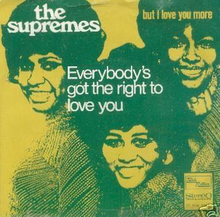Everybody's Got the Right to Love
| "Everybody's Got the Right to Love" | |||||||||||||||
|---|---|---|---|---|---|---|---|---|---|---|---|---|---|---|---|
 |
|||||||||||||||
| Single by The Supremes | |||||||||||||||
| from the album Right On | |||||||||||||||
| B-side | "But I Love You More" | ||||||||||||||
| Released | June 25, 1970 | ||||||||||||||
| Recorded | 1970, Golden World Studios, Detroit, Michigan | ||||||||||||||
| Genre | R&B, Pop | ||||||||||||||
| Label | Motown | ||||||||||||||
| Writer(s) | Lou Stallman | ||||||||||||||
| Producer(s) | Frank Wilson | ||||||||||||||
| The Supremes singles chronology | |||||||||||||||
|
|||||||||||||||
| 12 tracks |
|---|
|
"Everybody's Got the Right to Love" is a socially conscious–inspired pop song written by Lou Stallman, produced by Frank Wilson and released as a single in 1970 by Motown group The Supremes, who took the song into the top forty in mid-1970 following the release of "Up the Ladder to the Roof".
The songs features new Supremes lead singer Jean Terrell in lead with backup vocals by original Supreme Mary Wilson and long-time Cindy Birdsong. The lyrics describe how everyone should be able to loves more often saying "without love you can't survive". This is the first songs that showcases the group's vocals as a group, which had not been done since the late 1960s; At the start of the song the quartet sings, "..Say I/Say Yeah..", in harmony. There are at least three different versions of the song. One appears on the Supremes' "70's Greatest Hits & Rare Classics" and the other on The Supremes (2000 album).
The song became a top 30 hit for the Supremes peaking at number 21 on the Billboard Hot 100 and reaching number 11 on the R&B chart. "Everybody's Got the Right to Love was the second of eight top forty singles the Supremes scored after the departure of Diana Ross. It did not make the top 50 in the UK Singles Chart, interrupting an otherwise successful run of top ten hits for the group in Britain.
...
Wikipedia
